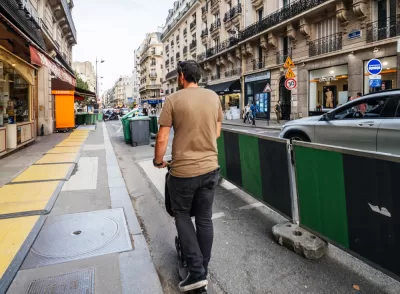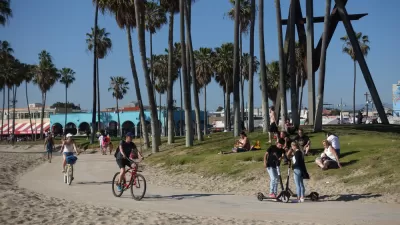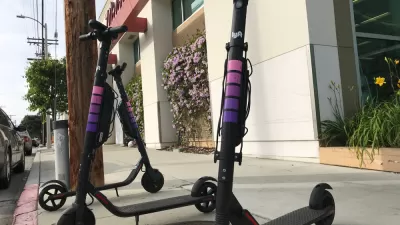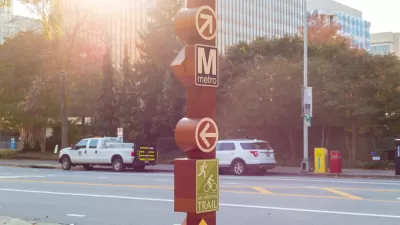New data on scooter safety highlights the ongoing need for cities and micromobility companies to figure out how to keep scooter riders safe in cities.

"A new study from the Insurance Institute for Highway Safety (IIHS) found a majority of e-scooter injuries happen on the sidewalk," reports Chris Teale.
"Nearly three in five scooter riders were injured on the sidewalk," according to the study, reports Teale. The study examined 500 scooter and bike riders, finding that scooter riders are more likely than bike riders to suffer an injury while riding "due to potholes or cracks in the pavement, or from hitting infrastructure like signposts or curbs."
Another key finding: nearly 40 percent of scooter riders who suffer injuries do so on their first ride.
According to Teale, the data on scooter safety emerges as cities continue to look for ways to accommodate the new mode of transportation in an increasingly cluttered street system. "Assessing the benefits of e-scooters versus other modes of transportation has become a common practice as cities wrestle with how scooters can be integrated into a multimodal network, and how infrastructure can keep up," writes Teale.
The data from the study would seem to say that riders are favoring sidewalks despite prohibitions on the practice in some cities, and even some geofencing capability on the scooters to keep riders off the sidewalk. Given that bike riders are more likely to be hit by a car, according to the study, the street probably doesn't seem like a safe alternative to many scooter riders.
"Jessica Cicchino, IIHS' vice president of research and the lead author on the study, said it remains to be seen where the safest places are for scooter riding, as no solution is perfect," writes Teale.
FULL STORY: Most scooter injuries happening on sidewalks: study

Planetizen Federal Action Tracker
A weekly monitor of how Trump’s orders and actions are impacting planners and planning in America.

Maui's Vacation Rental Debate Turns Ugly
Verbal attacks, misinformation campaigns and fistfights plague a high-stakes debate to convert thousands of vacation rentals into long-term housing.

San Francisco Suspends Traffic Calming Amidst Record Deaths
Citing “a challenging fiscal landscape,” the city will cease the program on the heels of 42 traffic deaths, including 24 pedestrians.

Amtrak Rolls Out New Orleans to Alabama “Mardi Gras” Train
The new service will operate morning and evening departures between Mobile and New Orleans.

The Subversive Car-Free Guide to Trump's Great American Road Trip
Car-free ways to access Chicagoland’s best tourist attractions.

San Antonio and Austin are Fusing Into one Massive Megaregion
The region spanning the two central Texas cities is growing fast, posing challenges for local infrastructure and water supplies.
Urban Design for Planners 1: Software Tools
This six-course series explores essential urban design concepts using open source software and equips planners with the tools they need to participate fully in the urban design process.
Planning for Universal Design
Learn the tools for implementing Universal Design in planning regulations.
Heyer Gruel & Associates PA
JM Goldson LLC
Custer County Colorado
City of Camden Redevelopment Agency
City of Astoria
Transportation Research & Education Center (TREC) at Portland State University
Jefferson Parish Government
Camden Redevelopment Agency
City of Claremont





























